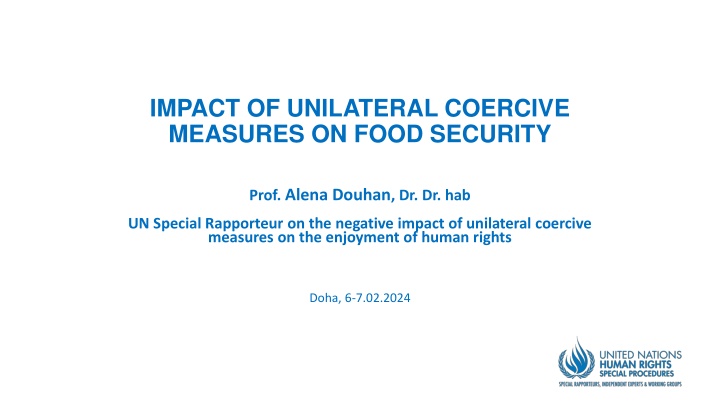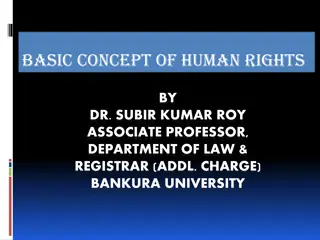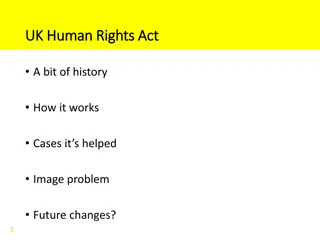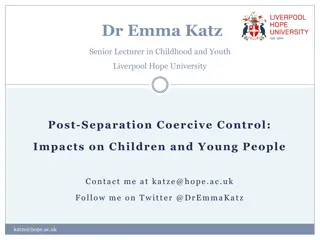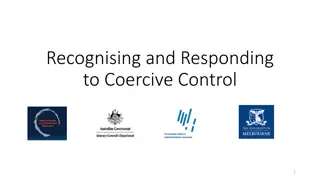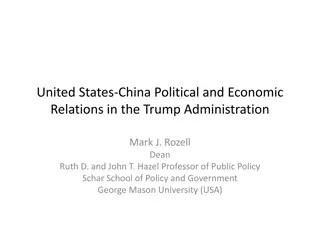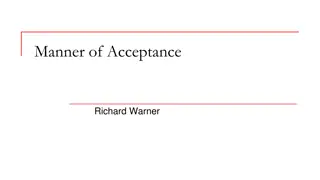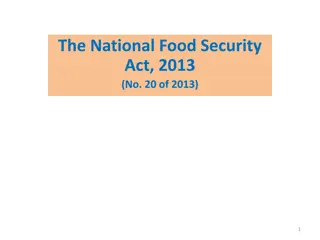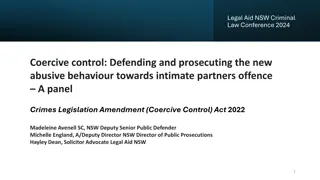Impact of Unilateral Coercive Measures on Food Security and Human Rights
This presentation by Prof. Alena Douhan, the UN Special Rapporteur, addresses the negative impact of unilateral coercive measures on food security and the enjoyment of human rights. It delves into the consequences of over-compliance with sanctions, challenges in delivering food and agricultural essentials, and the various impediments faced in ensuring the right to food under SDG 2. The content highlights the complexities, uncertainties, and risks associated with sanctions enforcement, emphasizing the need for addressing these issues to safeguard food security and human rights.
Download Presentation

Please find below an Image/Link to download the presentation.
The content on the website is provided AS IS for your information and personal use only. It may not be sold, licensed, or shared on other websites without obtaining consent from the author.If you encounter any issues during the download, it is possible that the publisher has removed the file from their server.
You are allowed to download the files provided on this website for personal or commercial use, subject to the condition that they are used lawfully. All files are the property of their respective owners.
The content on the website is provided AS IS for your information and personal use only. It may not be sold, licensed, or shared on other websites without obtaining consent from the author.
E N D
Presentation Transcript
IMPACT OF UNILATERAL COERCIVE MEASURES ON FOOD SECURITY Prof. Alena Douhan, Dr. Dr. hab UN Special Rapporteur on the negative impact of unilateral coercive measures on the enjoyment of human rights Doha, 6-7.02.2024
Unilateral sanctions Economic, financial, trade, transport, insurance, cyber etc. Sectoral Targeted SWIFT Sanctions enforcement Secondary sanctions Criminal charges for circumvention of sanctions regimes Civil penalties Maximum pressure campaigns Unofficial pressure Over-compliance Zero-risk policies Discharge of any nexus to the countries under sanctions
Reasons and consequences of over-compliance Multiple, over-lapping, confusing and fast changing sanctions regimes; Uncertainty: scope of sanctions, complicated regulation; exemptions; licensing; Active use of non-binding instruments to enforce/ enterprete binding ones treated as binding; High risk of high penalties; Enormous costs of sanctions compliance due diligence Costly, lengthy and limited de-listing/de- penalization process access to justice; Prohibition of permitted activity by other means; Reputational risks Non-selectivity; Discrimination and isolation of nationals/ companies of CuS; Breach of co-operation networks even in the recognized emergency situations; Non-efficacy of humanitarian carve-outs; High risks for humanitarian workers; Non-implementation of humanitarian resolutions of the UN Security Council; No access to justice / no protection for those affected by over-compliance;
Right to Food. SDG 2 Challenges Impacts Impediments in delivery of food, seeds, agricultural mashinery, spare parts, fertilizers, livestock vaccines etc.; Moderate and Severe malnutrition/ hunger Unbalanced food baskets, insufficiency of proteins, vitamins Insufficiency of fuel: agricultural machinery, food processing and storage, delivery of food for remote areas; ICCPR: right to life, right to decent life, freedom from torture ICESPR, CRC; CEDAW; CRPD freedom from hunger Multiplying costs of food and goods necessary for agriculture, transportation costs; Sacrifysing health fir nutrition (selling medicine to buy bacis food) Access to the newest knowledge; Non-sustainability of the population high level of dependance on governmental support and humanitarian assistance Undermined plant and livestock disease prevention capacities Deteriorating labor environment, environment, growing use of handwork in the agriculture; Baby formular/ health related diets unavailability /insufficiency Growing poverty rates, unavailability of food basket: ratio, proper nutrition; Involvement in the gray economy, terrorism or criminal activity as the means of survival Reduced access to clean water and sanitation, transportation, use of sewage for irrigation purposes risks of water-borne deceases; Growing mortality rates, reduced life expectancy; Higher level of gender violence or discrimination Inefficacy and inefficiency of humanitarian exemptions; Impediments for implementation of the UN SC humanitarian resolutions
Legalchallenges Principles of international law ICCPR, ICESPR; CRC; CEDAW; CRPD FAO, WFP nutrition standards WHO standards on nutrition; Guiding principles on Business and Human rights; SDGs 1, 2 Law of international responsibility State of national emergency Extraterritoriality, state jurisdiction Law of international security Law of international organizations Regional cooperation schemes International trade law Transportation agreement Economic, etc, bilateral and regional treaties
Recommendations made Monitoring of the impact of UCMs on the right to food by all stakeholders Include impact of UCMs to the right to food to the agenda of FAO, and other relevant IGOs Establishment Sanctions monitoring tool https://www.ohchr.org/en/calls-for-input/2024/call-input- 2024-thematic-report-57th-session-un-human-rights-council Monitoring of impact via the UPR and assessment of the progress of the achievement of SDGs Preliminary assessment of the legality of any actions taken by states without authorization of the UN Security Council, listing measures which do not correspond IL lifting UCMs Preliminary and ongoing humanitarian impact assessment, implementation of due diligence and precaution principles Use of the UN HR treaty bodies for protection of the right to food and related rights Use of means of peaceful settlement of international disputes Minimization of over-compliance via implementation of due diligence obligations Development of the GP on sanctions, business and HR https://www.ohchr.org/en/calls-for- input/2024/call-input-guiding-principles-sanctions-compliance-over-compliance-and-human Ensure proper implementation of the UN SC humanitarian resolutions Expansion and proper implementation of humanitarian exemptions Never targeting critical infrastructure
